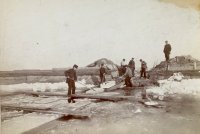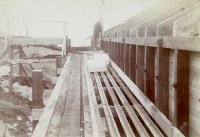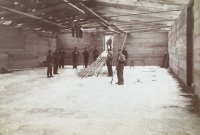Zephyr Used & Rare Books
56596 [ICE HARVESTING -- PHOTOGRAPHS].
[An intriguing set of six albumen Gilded Age photographs documenting the harvesting of ice blocks from a canal above a city, and workers feeding them down a wooden chute into an ice house].
$475
Item Details
[n.p.:, n.p.,, ca. 1880]., N/A
N/A, VG-
Six albumen photographs sized 4.5 x 6.75 in., mounted on beige-coloured studio boards, sized 8 x 10 in. (minor soiling, and tidemarks to fore-edges of the boards, very minor over-exposure to a couple of the images), still a VG- set of images, w/ good contrast and sharpness.
This unusual series of images chronicles the critical occupation and industry of ice harvesting and ice houses in an unidentified U.S. city in the 19th Century. By the post-Civil War period most homes and businesses owned and maintained ice boxes serviced by ice companies and warehouses to cool dairy products, beer, perishable goods, and more through the hot summers before electric refrigeration. Ice cutting operations tended to operate heavily on unpolluted rivers, ponds, lakes, and canals in New England, near the Great Lakes, and other areas of the East Coast in order to provide ice blocks which would be stored in huge wooden double-reinforced ice warehouses 30 to 40 feet high, and insulated with straw. The first of these images shows ice harvesters sawing the ice with large toothed ice saws, as well as others holding the hand plows to smooth the ice before harvesting, with view of the stone embankment, and cityscape just beyond. Second image shows a team, sawing and preparing to lift out the blocks; the third shows workers standing on wooden platforms, and up on the embankment shoveling the cut ice blocks onto wooden chutes, interestingly with a life preserver ring attached with rope coiled on a floating wooden plank in the foreground. The next three in the series show the chute, the ice blocks sliding down, and finally, being loaded into the nearly full ice warehouse, with about 10-15 feet of space remaining, and workers carefully preparing the layers already completed. It should be noted that these ice blocks do not appear to have the 10-12 inch thickness common in ice harvesting out in the wild, and all of the work is done manually including the ice chutes, rather than conveyor belts which became standard equipment by the 1890s. See: Brian Hubert, Recalling History of Ice Harvesting in Hudson Valley, Daily Freeman (Jan. 25, 2015); Sam Moore, Ice Harvesting in the 19th Century. . . a Boom Business in the Northeast U.S., Farm Collector (March, 2007); Henry Johnson, The Upkeep of Ice Properties, Natural Ice, Refrigerating World, Vol. 52, No. 1, pp. 45-47.
Zephyr Used & Rare Books
Kol Shaver
P.O. Box 55
Vancouver, WA, 98666
United States
Phone: (360) 695-7767
Cell: (360) 606-7735
Featured Catalogue
Visit Website
Specialities
Trade Catalogues, Western Americana, Photographs
More Information
Booth 23
Shipping and Returns
All offers subject to prior sale. Payment and discount terms are available for institutions and usual discounts apply. We accept Visa, MasterCard & Amex, PayPal, and payment by check. All books are in fine condition unless otherwise stated. Postage will be added to all shipments. We hold books for 7 days pending receipt of payment, once we have received confirmed order (duplicate orders will be replied to in order). All books can only be returned if not as described within 7 days and receive refund of original price, if the purchaser has TELEPHONED to (360) 695-7767 and notified us first, and if the book has been returned in condition shipped out (email return notification WILL NOT BE ACCEPTED, NO REFUND WILL BE ISSUED) .
Additional Information
Any further questions please refer to www.zephyrusedandrarebooks.com.
![[An intriguing set of six albumen Gilded Age photographs documenting the harvesting of ice blocks from a canal above a city, and workers feeding them down a wooden chute into an ice house].](https://bookandpaperfairsonline.us-east-1.linodeobjects.com/thumbs/174597227356596IceHarvestingPhotosPhoto3.jpg)





